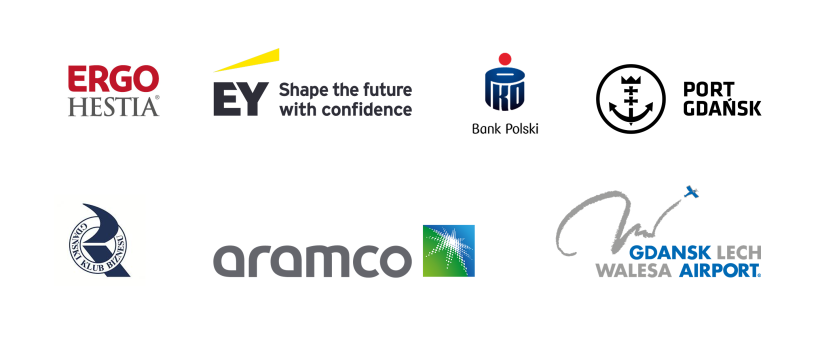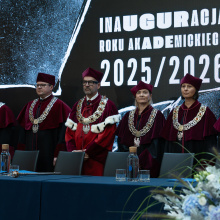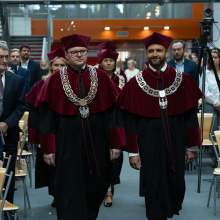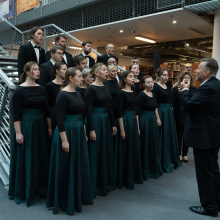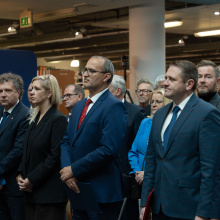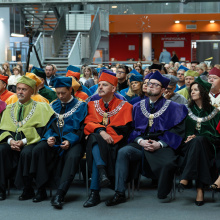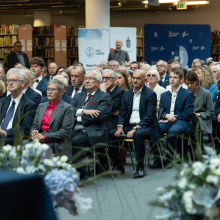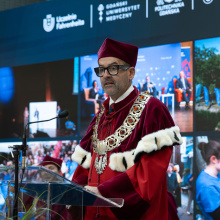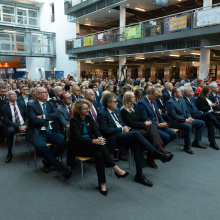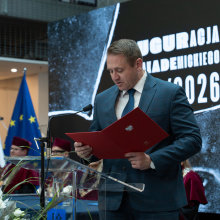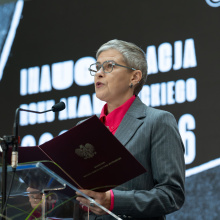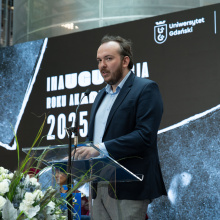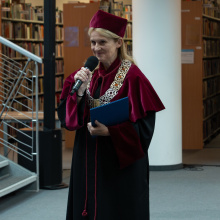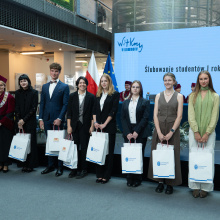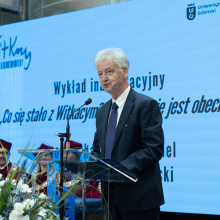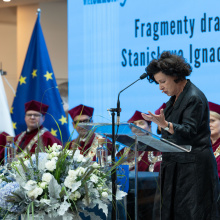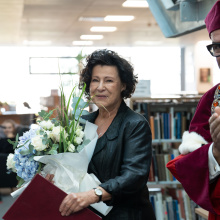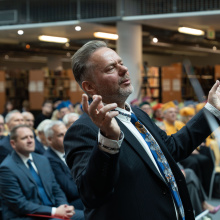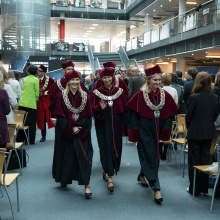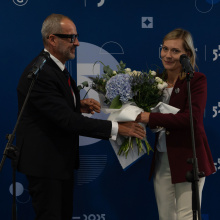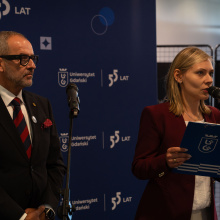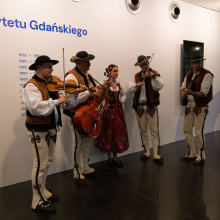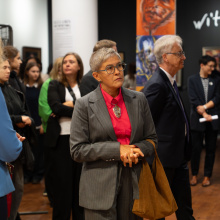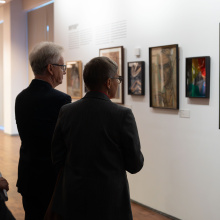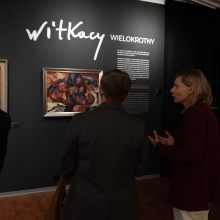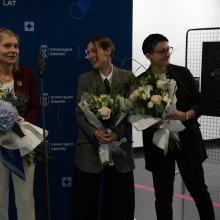‘The university is a kind of refuge for daring and unconventional thinking’. On October 3, a ceremonial session of the Senate of the University of Gdańsk was held at the University Library to mark the inauguration of the 2025/2026 academic year. The patron of this year's event was Stanisław Ignacy Witkiewicz - Witkacy - on the occasion of the 140th anniversary of his birth.
This year's inauguration of the academic year at the University of Gdańsk, concluding the celebrations of the university's 55th anniversary, was an opportunity for reflection and summary. The Rector of the University of Gdańsk, prof. dr hab. Piotr Stepnowski, reminded everyone of the importance of the University in the context of historical changes, as well as its contemporary achievements.
‘Over the past 55 years of our history, we have not only developed our university and broadened the horizons of Polish science, but we have also actively participated in the epoch-making changes that have shaped the face of our country and, on many occasions, influenced the course of European and global history,’ said the Rector of the University of Gdańsk.
Stanisław Ignacy Witkiewicz, known as Witkacy, became the patron of the event. As prof. Piotr Stepnowski emphasised, this choice was not accidental: on the 140th anniversary of Witkacy’s birth – a birth of a visionary, creator, author of groundbreaking theories and bold polemics with the world of philosophy and science - the University of Gdańsk community pays tribute to him through a series of events: from conferences and performances to an exhibition of his works, presented at the University of Gdańsk Library. The Rector showed the university as a good space for visionaries:
‘The university is a kind of refuge for daring and unconventional thinking, for students and scientists who, with ‘Witkacy-like’ passion, take on new intellectual challenges in all areas of knowledge. Questions and searches give rise not only to answers, but also to new questions - contrary to the rhythm of the modern world, which is increasingly devoid of depth and struggles to defend such fundamental values as truth.’
A traditional element of the Rector's inaugural speech is the presentation of the university, its achievements and what it offers to the academic community: both researchers and students. And the University of Gdańsk, in its 55th year of operation, has a lot to boast about. The University of Gdańsk's participation in the CoARA coalition, thanks to which it has an influence on the reform of science evaluation, the extension of the right to use the HR Excellence in Research logo for another three years, and numerous scientific, development, teaching, and investment projects financed through national and international grants are just some of its achievements.

Prof. Piotr Stepnowski cited examples of research and projects (scientific and strategic), and drew attention to how (in Poland and around the world) scientists from UG and their work are appreciated. He emphasised the growing position of UG in rankings, e.g. its promotion in the ‘Perspektywy’ ranking, the presence of UG scientists in the list of the 2% most influential researchers in the world, compiled by Stanford University in collaboration with Elsevier, and UG's highest scores in several categories of THE Impact Rankings 2025. The latter result (alongside the European Commission's EU Award for Gender Equality Champions in the Newcomer category) demonstrates the commitment of the UG community to building a better, more sustainable world.
Cooperation is also a very important element of the University's activities: both with other academic centres (e.g. within the Fahrenheit Union of Universities in Gdańsk) and with representatives of local government and business entities (an example is the University of Gdańsk's involvement in a project related to the construction of Poland's first nuclear power plant). Professor Stepnowski also emphatically stressed the importance of the internationalisation of the university, not only by citing the University of Gdańsk's involvement in international projects (including participation in the Sea-EU alliance), but also by welcoming foreign students and researchers in English.
Prof. Piotr Stepnowski thanked the representatives of the authorities who support the University's activities in various ways - at the local, regional, central, governmental, and parliamentary levels. Finally, he addressed the students, referring to Witkacy's biography: ‘As some of you probably know from secondary school, he began studying at the Academy of Fine Arts in Kraków against his father's will. We do not know who he would have been and what kind of artist he would have become if it had not been for his persistence and consistency. And you, dear students, pursue your authentic desires, those that will allow you to develop. Choose wisely, but do not succumb to fads, do not bend to the labour market, because the rapidly changing reality may mean that only people who do their work with passion are so creative and open-minded that they will find their place in any new conditions.’
Speeches by invited guests
After the Rector's speech, the following guests took the floor: Undersecretary of State in the Chancellery of the President of the Republic of Poland Mateusz Kotecki, who read a letter from the President of the Republic of Poland Karol Nawrocki, Undersecretary of State in the Ministry of Science and Higher Education prof. Maria Mrówczyńska, who read a letter from the Minister of Science and Higher Education Marcin Kulasek, and Vice-President of the UG Student Parliament Piotr Patalas.
Piotr Patalas acted as a key source of information for students, especially those just starting their adventure with the university. He presented various ways in which students can pursue their passions at the University of Gdańsk (because studying is not only about learning), as well as where to find the necessary information and help (pointing, among others, to the Student Parliament, the Centre for Student and Doctoral Activities, and the Academic Psychological Support Centre at the University of Gdańsk). He encouraged them to familiarise themselves with the study regulations and to become actively involved in university life. ‘The university has many colours, and you decide which one you will be,’ he emphasised.
Student matriculation
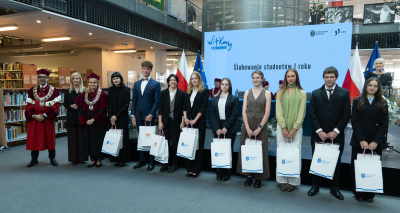
The students who obtained the highest number of points in the recruitment process for individual faculties took a solemn oath, introducing them to the academic community of the University of Gdańsk. This part of the ceremony was led by the Vice-Rector for Student Affairs, dr hab. Urszula Patocka-Sigłowy, prof. UG. After the oath, the students received symbolic gifts from the rector's office, as well as diplomas and a gift from the city authorities, represented by the Deputy Mayor of Gdańsk, Emilia Lodzińska.
Inaugural lecture and artistic part
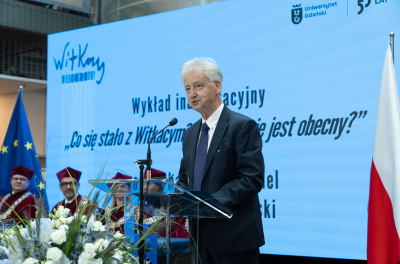
The inaugural lecture entitled ‘What happened to Witkacy? Is he present or not?’ was given by prof. dr hab. Jacek Popiel from the Jagiellonian University – an eminent theatre and literature scholar, rector of the Jagiellonian University for the 2020-2024 term, and before that (1999-2002), rector of the Ludwik Solski State Theatre School in Kraków.
The former rector of the Jagiellonian University began rather provocatively - by asking why Witkacy's spirit had come to Gdańsk. ‘This is probably the first time that such an important academic event has taken place at a Polish university. He would certainly be proud, although he would never show it. But seeing today's ceremony, the gowns, the songs of Piotr Stepnowski in ermine, he would immediately play a prank or put on one of his characteristic expressions.’
Another thought concerned the lecturer himself: why should Jacek Popiel talk about Witkacy, since he does not specialise in his work at all? In the course of his lecture, however, prof. Popiel discovered his own connections with Stanisław Ignacy Witkiewicz:
‘Popiel was significantly influenced by the author of The Shoemakers. After all, his teacher, mentor and doctoral thesis supervisor was prof. Jan Błoński, and his doctoral thesis reviewer was prof. Janusz Degler, two of the most prominent researchers of Witkacy.’
Prof. J. Popiel also cited the example of eminent literary critics, such as the aforementioned prof. Jan Błoński, who for many years did not dare to take on the challenge of writing about Witkacy and his art. ‘He was [prof. Jan Błoński - ed. note] probably convinced that only a researcher who was at least as good as Witkacy himself could write a monograph about him.’
Prof. Popiel also spoke about the many conflicting feelings associated with his own perception of Witkacy's work (ranging from fascination to irritation). Finally, he concluded: ‘The more pages I read, the more often I think that his greatest work is himself. Witkacy, Stanisław Ignacy Witkiewicz. The man, his biography. That is what fascinates me the most.’
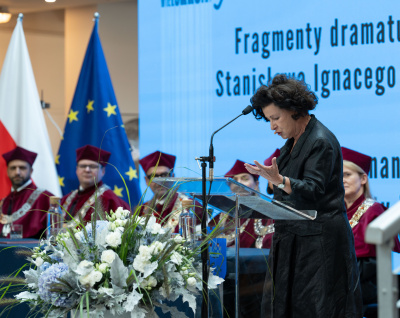
The lecture was complemented by an artistic presentation during which actress Prof. Dorota Kolak from the Wybrzeże Theatre gave an expressive performance of an excerpt from S. I. Witkiewicz's play ‘Matka’ (Mother), in which she had performed at the Wybrzeże Theatre. The artist's performance was received with a long-standing ovation.
At the end of the ceremonial meeting of the Senate of the University of Gdańsk on the occasion of the inauguration of the 2025/2026 academic year, the University of Gdańsk Choir performed under the baton of prof. Marcin Tomczak. The choir was accompanied by the highlander band of the Stanisław Ignacy Witkiewicz Theatre in Zakopane, which added splendour to the inauguration celebrations with two performances played especially for the academic community. The highlander accents referred to the friendship between artists strongly associated with the Podhale region: Stanisław Ignacy Witkiewicz and Karol Szymanowski, composer and author of the ballet ‘Harnasie’, from which the piece performed (in a traditional folk version) was taken.
After the ceremony, the Rector of the University of Gdańsk invited the guests to the opening of the exhibition ’Witkacy Wielokrotny’ (‘Witkacy the Multiple’), prepared by the University of Gdańsk Museum in the UG Library. The curator of the exhibition is the Director of the University of Gdańsk Museum, Marta Szaszkiewicz-Sawa. The exhibition features paintings, pastels, reproductions of Witkacy's photographs, as well as costumes, set design elements and photographic documentation of Tricity stagings of his works.
A recording of the ceremony can be viewed here: Inauguration Ceremony of the 2025/2026 Academic Year at the University of Gdańsk.

Video by M. Byczkowski
| Attachment | Size |
|---|---|
| Przemówienie Rektora UG z okazji inauguracji roku akademickiego | 128 KB |
| List Marszałka Sejmu | 380.65 KB |
| List Ministra Nauki i Szkolnictwa Wyższego | 626.9 KB |
| List Minister Edukacji | 529.37 KB |
| List Ministra Cyfryzacji | 898.81 KB |
| List Prezesa Głównego Urzędu Miar | 518.11 KB |
| List P. Mullera posła do Parlamentu UE | 470.77 KB |
| List Dyrektora ECS | 36.08 KB |
| List Prezesa GTN | 224.46 KB |
| List Przewodniczącego DTN-SiP | 56.93 KB |
| List Rektora Uniwersytetu Papieskiego JPII w Krakowie | 512.21 KB |
| List Rektora AMUZ w Gdańsku | 381.35 KB |
| List Rektora UAM w Poznaniu | 381.88 KB |
| List Rektora UKSW | 318.99 KB |
| List Rektora UMCS | 470.42 KB |
| List Rektora Uniwersytetu Jana Kochanowskiego w Kielcach | 391.75 KB |
| List Rektora Uniwersytetu Opolskiego | 245.11 KB |
| List Rektora Uniwersytetu Rzeszowskiego | 1.51 MB |
| List Rektora Uniwersytetu w Białymstoku | 281.98 KB |
| List Rektora UWM | 669.53 KB |
